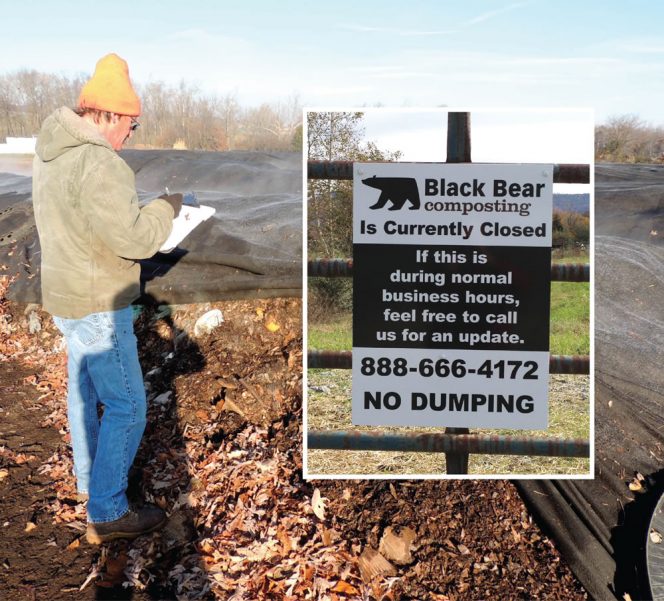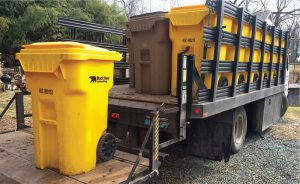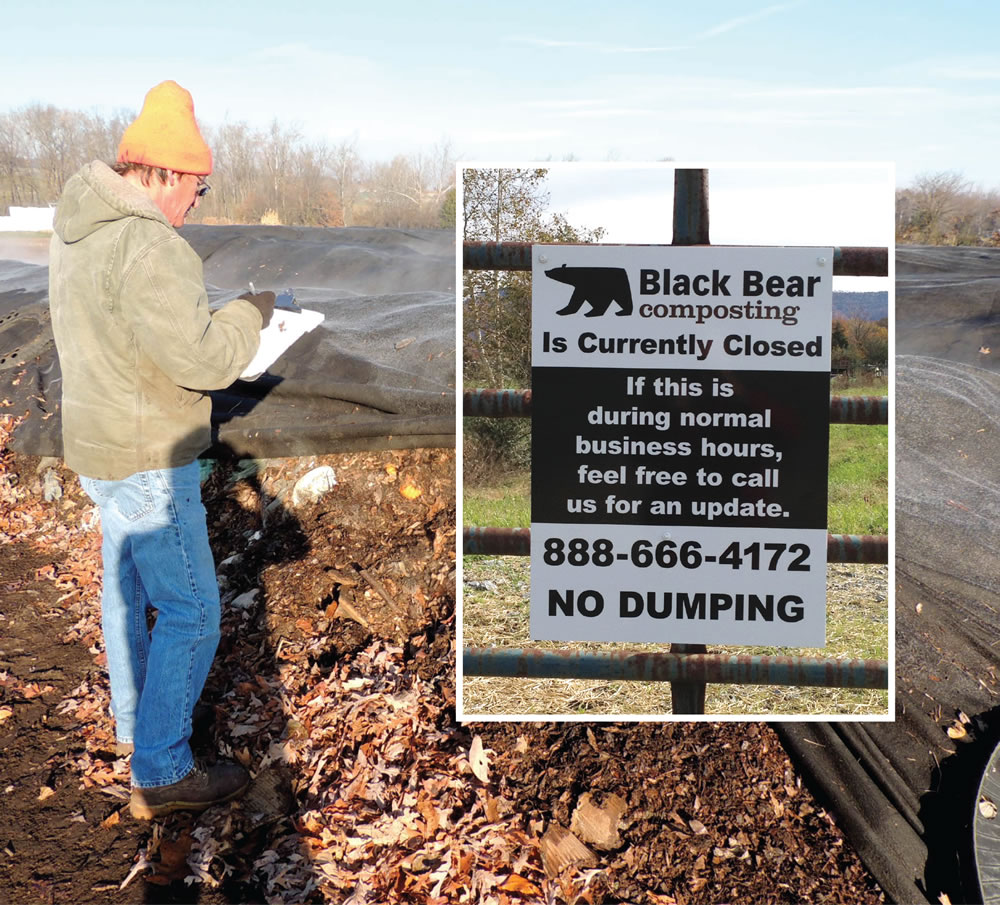Founder and owner of Black Bear Composting in Crimora, Virginia, which closed its composting operation but continues to offer organics collection, relates his experiences and lessons learned.
Eric Walter
BioCycle March/April 2017

Black Bear Composting (BBC) stopped accepting new materials for composting in December 2016. It is open to sell remaining compost.
When we began in May 2010, converting food waste into a restorative soil amendment seemed magical and I wanted to do my part to grow this practice in our area. BBC, located in Crimora, set out to be a “medium-size” food scrap composter focused on a 50-mile radius that encompassed Charlottesville and the central Shenandoah Valley. At that time, this market included four small cities with a combined population around 150,000, two large public universities, four hospitals, a national park and several food production plants. Our service area was also rich in agriculture and land development opportunities that seemed like great markets for the finished compost we would produce. And to keep the company from getting caught in a quest for larger and larger volumes of incoming feedstocks in order to survive, we intended to be more of a service company — targeting compost end users — than a production or manufacturing company. Our hope was to provide compost services related to green storm water infrastructure, Leadership in Energy & Environmental Design (LEED) building and holistic lawn management.
Enjoying Successes
Despite the ultimate decision to close, we enjoyed some successes. Over five years, over 7,900 tons of materials were composted (equivalent to the amount of carbon sequestered by 3,151 acres of U.S. forests in one year). We had great success with educational institutions ranging from private preschools to state universities. Schools appreciated the benefits of recycling organics, held environmental stewardship as a core value and saw composting as a great teaching opportunity. Not only did students grow to be more mindful of their environmental impact, they learned about the decomposition process and soil biology. Given the number of schools BBC worked with on a regular basis, we raised awareness with over 50,000 students during those five years.
Compost sales were another big win. We enjoyed robust sales to small farms, home gardeners, and natural turf/lawn professionals. Most of BBC’s finished product customers started with an initial purchase to see if compost use would make a difference. Almost all of them became regular customers. We also promoted compost use to our providers of food scraps by offering them free and discounted compost. This not only helped sales of the finished product, but created value for our collection services. We regularly sold out of our finished compost.
What went wrong? Simply put, BBC did not receive enough feedstocks to cover the capital and operating expenses associated with the facility. How could that have happened with food scraps and yard trimmings making up 28 percent of municipal solid waste? There was no shortage of available organics, just a shortage of overall will to do something with those materials other than landfilling. We underestimated the effect that a lack of local/state public policies on recycling would have on our business. Virginia has only recycling targets, with no consequences for not meeting the target rates. This results in making all recycling (including organics) optional, resulting in limited participation.
Additionally, I now believe that thin profit margins make composting operations better suited as a complementary side business instead of a standalone business. The $45/ton tipping fee BBC charged for accepting food scraps had to cover the expenses of proportional utilization of facility resources (land, equipment, staff) over the 6 month composting process, including the acquisition of 2 tons of carbon-rich feedstocks to mix with the food scraps. Sales of finished compost product should have been profit, but often had to help cover any process/volume inefficiencies or unexpected expenses. Thin margins would have been more forgiving if our compost business was coupled with a complementary business — such as a plant nursery, mulch production, land clearing operation or landscaping — that could have gained value from the processing of the materials or the use/sale of the finished product.
The Early Days
Permitting
Our first smart decision was to hire a technical advisor with experience in permitting, siting, planning and operating composting facilities. BBC hired Coker Composting and Consulting to help expedite our start-up timeline and avoid common pitfalls. Craig Coker helped us quickly articulate the type of facility we wanted to be (turned windrows) and how much space that would require, including good buffers from neighboring properties. He also helped navigate Virginia’s Department of Environmental Quality (DEQ) permitting process. Our timing was fortunate because Virginia was shifting from an open-ended process to a more predictable permit-by-rule.
Given that we would have an ongoing relationship with Virginia DEQ (e.g., permit renewals, regulatory oversight), we started by meeting with DEQ. By showing our intentions, operational plans and approach to start up, we avoided any potential future misunderstandings or incorrect assumptions. We also learned about their concerns so that we could address them operationally. Our regulators wanted to see composting facilities succeed. Establishing a good working relationship is critical.
Siting
Siting the facility was a big hurdle, taking over a year. Based on our operational approach and volume, Coker determined that 30 to 40 acres would be ideal and feasible, providing plenty of room to grow and plenty of distance from neighbors. We met with economic development offices in the counties where we were considering locations to introduce them to our concept and get their assistance in finding suitable areas to look for land. The officials steered us clear of areas already intended for future development, shared their GIS resources for a programmatic search and even identified local businesses that might benefit from our services. The local economic development offices were also key in getting us preliminary feedback from county officials who would be involved in the local permitting process. That process would turn out to be the make or break point in starting our composting facility.
“Eric, I love what you are doing. I just don’t want it in my backyard.” With those words, I learned that Not-In-My-Backyard (NIMBY) was very real and backyards can stretch for miles beyond property lines. Nearby commercial property changes seem to make people nervous. A new business could bring more traffic, noise, change the viewshed, etc. Factor in waste materials such as food scraps and you can add air and/or water pollution and vermin control to their concerns. Quick Internet searches do not always show composting facilities in a good light.
We went door-to-door to meet potential neighbors to directly address these concerns, showing our plans and pictures of similar operations, answering questions and providing direct contact information for follow-up conversations. This approach was valuable and I would do it again, but NIMBY still led to changing our first desired location (due to an active public hearing) for the location we are at today.
The 47-acre property we settled on was zoned agricultural, but still required a special-use permit since commercial composting was not listed as an approved agricultural activity. The permit required a public hearing in which all adjacent property owners were invited. Many people from the greater community attended and raised their concerns, even after our outreach and communication. A panel of elected supervisors was tasked with deciding whether to allow this business to start amid these viewpoints expressed.
Understandably, the supervisors were reluctant, until a director from our regional DEQ office stepped forward to speak. He discussed his experience with composting facilities, addressed the concerns raised by citizens and assured that our facility would be closely regulated by his office. That gave the supervisors the assurance that if anything went wrong at Black Bear, it was DEQ’s responsibility to resolve and not theirs. Had it not been for our regulator foreseeing the need to speak at this meeting, Black Bear Composting would never have had the opportunity to start.
Walking Before You Run
Starting Small
While we wanted to be a medium-size composter, we didn’t have the means or the desire to start off with the facility capacity and equipment for that scale. We would start small, economically and grow into a medium size operation, which we considered to be 10,000 tons/year. The facility was sized for an initial capacity of 2,800 tons/year (tpy). At 2,800 tpy, BBC was permitted to compost on bare ground, a significant savings from needing to have the impervious surfaces required for more than 4,000 tpy capacity in Virginia. We only needed two acres for actively composting and curing windrows, and saved on initial capital costs by using our tractor as our loader and acquiring a tractor-pulled windrow turner. We decided to contract with another compost company to screen our materials, rather than buy a screener. And wherever possible, we didn’t need to buy new if we could buy used.
Collection Service
Starting with zero customers and with no one else composting food scraps in the area, BBC had to provide its own collection capabilities. We settled on 65-gallon wheeled-carts (Toters®) as our means of collection and servicing clients. Ideally, a watertight truck that we could dump into and provide a quick rinse of those carts would have been preferable, but we could get started for a lot less by using a stake body truck to collect full carts, swap them out for clean ones and bring the full ones back to our facility to tip out and wash. High-volume customers that needed containers larger than our Toters® could be serviced through a third-party hauler.
Providing collection services allowed BBC to have direct relationships with customers, quickly address contamination issues and to periodically provide finished compost as part of the service. The finished compost was often donated by our clients to schools and community gardens, thus building awareness about composting while adding value to our service.
Compost Sales
Of all the aspects of the business, I felt the least confident about finished product sales. It seemed like a complicated product to sell without a really strong demand in our area. To start, we enrolled in the US Composting Council’s Seal of Testing Assurance (STA) program, which gave our product extra visibility and established our compost as a high-quality product.
With that in hand, BBC focused on bulk sales to growers in the popular local farm-to-table movement, landscapers and avid gardeners. We also provided discounts on compost to those that subscribed to our collection services.
In October 2011, we opened our gate for business. We had all of our permits, the means to process up to 2,800 tons of organics and a microbial fire in our hearts. With no customers, no materials to compost and no finished compost available for sale, we got our first phone call: “Hello. I’m with the University of Virginia. I heard you were open for business?” Pleasantly surprised by the call, I replied, “Yes. Yes we are.”
Is This Working?
Fast forward four years. Black Bear had developed a great reputation for making it easy to compost. Our client list included two state universities, one college, three public school systems, several private schools, three hospitals, several local restaurants, several corporate offices, a couple of grocery stores, a few local festivals and a national park. Any major producer of food scraps in our area was either working with us or knew about our services. We also had a residential collection program that was growing by word of mouth. On the finished product side, our compost was highly regarded and always sold out between the two times a year when we screened.
Cash Flow Strains
Sounds great, right? Except that our cash flow regularly required outside infusions to cover expenses and start-up loans. Seasonal compost sales were robust and put our books in the black, but not for long and certainly nowhere near enough to cover the deficiencies of the rest of the year. While I had lots of theories of why the business wasn’t making ends meet, it was only after a colleague reminded me that Black Bear Composting was really two businesses: a composting facility and a hauler. We needed to separate the accounting between the two businesses.
Low Feedstock Flow
Once we were able to split our income, expenses and loan obligations between the facility and hauling, it became clear that the facility was not profitable. The core problem was that we did not have enough paying materials coming through the gate. Four years in business and we weren’t even at the 2,800 tpy capacity that we set to minimize our start-up expenses. What wasn’t obvious was where the necessary materials were going to come from. If an organization that generated compostable waste within our area wasn’t working with us, it wasn’t because they weren’t aware of our services.
When we put together our business plan in 2011, a waste characterization report estimated that the Charlottesville area generated 90,000 tpy of food waste. Our service area was bigger; why couldn’t we get a mere 2,800 tpy after five years? One answer is that overall, our service area was relatively rural. With numerous farms in close proximity, a lot of local preconsumer, nonprotein food scraps was going to feed animals. I only learned about this when reaching out to individual generators. All of the grain from our booming local microbrewery scene went to cattle feed. National and regional supermarket chains in our area had statewide contracts with large-scale haulers that collected in-store organics to bring to feedlots. One national chain initially diverted organics from its supermarket to BBC for about a year until it discovered feedlots as a free alternative.
Local Landfill Access
Our area also has local landfill options. Three of the four cities in our service area have available landfills in their county, with tipping fees varying between $45 to $65/ton. With BBC’s tipping fee at $45/ton for food scraps, the potential savings were not significant enough to encourage widespread diversion or participation from existing haulers. In short, it is not really a problem to dispose food scraps in Virginia.
While Virginia has mandatory recycling reporting for localities with rate targets ranging from 15 to 25 percent (based on population), there are no consequences for not meeting those targets. Furthermore, those target numbers are relatively low and for the most part have been met for years with minimal activity and encouragement. With this level of emphasis on traditional recycling from the state, the priority for organics recycling is even further behind. Unlike some of our neighboring states, Virginia doesn’t have a ban on landfilling yard trimmings.
If I Had To Do It Over
While there are lots of little things that we should have done differently, there are four fundamental concepts that we see as critical for long-term success of a composting facility.
Public Policy
There has to be public policy prohibiting the landfilling of at least one of the core feedstocks, in our case, food scraps or yard trimmings. Such bans are critical in that they separate the banned material from the waste stream. The separated stream makes the volume of material quantifiable and creates the opportunity for private sector participation in the collection, transfer, hauling and processing points in the system.
Business Synergies
Thin profit margins, heavy equipment expenses, several acres of operating space and highly seasonal product sales make composting a financially precarious operation. At smaller scales, it would be better operationally if composting was part of a synergistic business or organization. Partnering would allow it to share all of the expensive parts of the business (land, equipment, equipment repairs, etc.) and provide a buffer for off-season slow downs. Thin profit margins of the facility would also be more tolerable if it was adding overall value to the complementary business.
Local Government Support
Like water, sewer and electricity, waste management is a necessity of modern life. A composting facility is a public utility resource to local residents and businesses. Just as most locales operate at least one element of the process (collections, transfer, processing), municipalities need to find ways to support their local composting facility or risk losing that resource. BBC should have been much better about staying in touch with our local governments. We should have been constantly exploring collaborations, ways to be of use to their citizens and probably a lot more direct about how our underutilization would lead to closure.

BBC continues to offer food scraps collection services wherever possible, utilizing more distant composting facilities. It is advocating to establish a transfer station system for organics to facilitate collection in multiple communities.
BBC should have spent a lot more on marketing ourselves and our services. We tied our marketing budget to a percentage of revenue, but it should have been a much bigger investment in our first few years as our revenue streams were just starting out. While any new business needs to market itself, we greatly underestimated what it would take to introduce the concept of composting to our local communities that had minimal awareness of composting when we started. We tried to make up for our gaps in traditional marketing by having a presence at events, direct sales and referral requests, but it just wasn’t enough.
Where To Go From Here
While BBC’s composting facility is closing once all compost is sold, Black Bear Composting will regroup and carry on with our collection services wherever possible, and utilize more distant composting facilities. We’ll advocate to set up a transfer station system for organics in the communities we service to keep the organics flowing to compost piles and not landfills. While the current local conditions are not right for a composting facility like BBC, they will be at some point in the future. We hope to be here when that happens.
Eric Walter is founder of Black Bear Composting in Crimora, Virginia.










